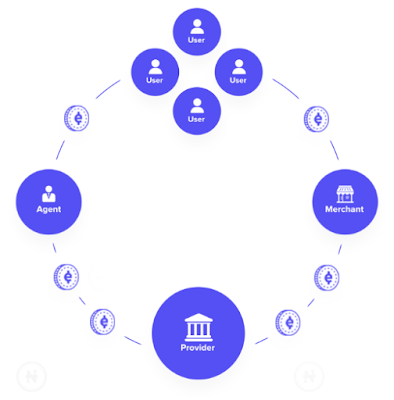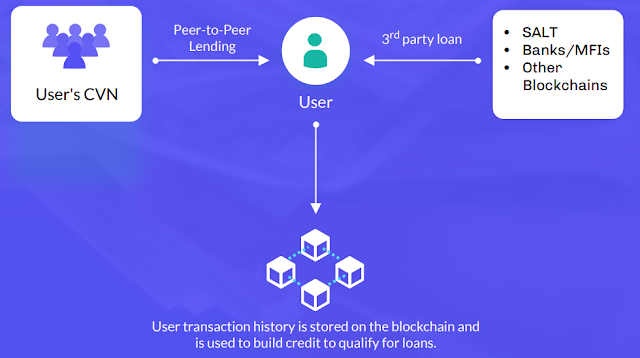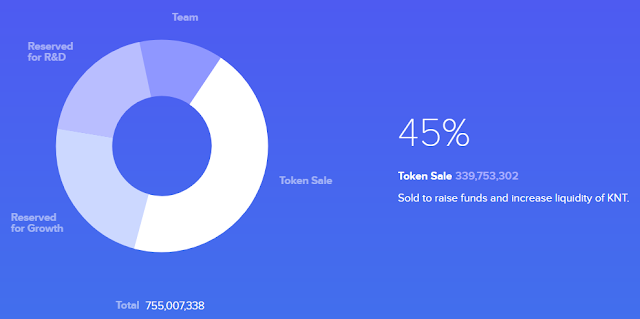Kora is a popular musical instrument in the
Western/Eastern region of Africa frequently played in songs of celebration, or
to pass a message of hope. Kora is also a project of hope for billions of
people who are underserved by the current financial system.
While there has been progress toward financial
inclusion, an estimated 2 billion adults worldwide don’t have a basic account. Barriers
to account-opening include distance from a financial service provider, lack of
necessary documentation papers, and lack of trust in financial service
providers.
See this video for more details about Kora Network
KORA Bounty Program
Problems
High Cost to Serve
Opening bank branches in rural or remote areas is
unprofitable due to high costs such as property fees, staff headcount, and IT
infrastructure. To offset these costs, banks charge high fees for account
maintenance, ATM withdrawals and money transfers Physical travel is another
issue; it can sometimes take more than a day to reach bank branches or ATMs.
Misconception that the Underserved have Little Value
The general perception is that underserved customers
would be transacting in “small” amounts. However, PWC estimates that the global
unbanked population holds at least $360 billion in unmet deposits in 2016
alone. In addition, a 2016 McKinsey report estimates that widespread adoption
of financial services through digital finance could result in a $3.2 trillion
increase in GDP of all economies by 2025.
Lack of Identification Documents
According to the World Bank, 1.5 billion people
worldwide lack any form of valid identification. Official or valid ID for
opening a bank account is often difficult to obtain in developing countries.
Lack of Trust and Technological Understanding
Many people without bank accounts perceive banks as
unsafe. There still exists a widespread lack of trust in financial technology,
including ATM’s and online banking.
Lack of Financial Literacy
We believe that with limited financial literacy,
people may be at risk of making poor financial decisions including taking loans
with interest rates they may not be able to pay, getting involved in pyramid
schemes, or paying unreasonably high charges on remittances or foreign exchange
mark-ups.
The Kora Ecosystem
We believe Kora will build wealth by creating
self-sustaining, community-owned ecosystems. “Selfsustaining” means the wealth
in the community as a whole grows, and “community-owned” means participants in
the existing community take on most of the key roles within the ecosystem.
eFiat
eFiat are digital versions of national currencies
that are 100% backed by cash reserves, and redeemable on a 1:1 basis. eFiat
will increase ease of use and adoption by offering users the benefits of
digital currency in a form they understand and trust.
Community Value Networks
Kora aims to empower instead of displacing existing
communities. Communities already providing ad hoc financial services will join
the Kora Network as Community Value Networks (CVNs).
Driving Adoption
Universal Access
Feature phones and SMS are still the dominant means
of communication in developing nations, and Kora can be utilized with even the
cheapest feature phones, or users can input a short code-number via USSD. Kora
will also provide a smartphone and web-based application. The user’s
transaction history will be stored on the blockchain and will be accessible if
the user later upgrades to a smartphone.
Identity
An estimated 1.1 billion people worldwide cannot
officially prove their identityxvii. Proof of identity is a significant barrier
to accessing financial services. Kora will provide a flexible on-boarding
process that will allow users to join the Kora Network xix in compliance with
all applicable laws and regulations. Upon joining, users will build reputation
scores connected to their actions within the Kora Network, as well as the
actions of the users they are connected to and transact with within the Kora
Network. The user’s transaction limits and access to services will increase as
they add more documentation and prove themselves to be honest and credible
actors. The actual proof of “identity” of users draws on the model pioneered by
uPort, with a focus on both privacy and recoverability.
Low Cost
The Kora Network aims to simplify operations so that
new Providers can provide financial services to Users without the cost of establishing
and running a front-toback financial institution. Kora will make launching a
financial services business as inexpensive and easy as launching a new instance
on AWS -- at low cost and with access to all functionality on the Kora Network.
Core software will be run on the decentralized stack, and anyone can customize
this software. Members will be able to link and exchange financial services to
other users on the Kora Network with low costs and near-instantaneous
transaction speeds. We expact the balance of power to shift, and financial
service providers would have to compete for customers, driving down prices for
users.
Network Architecture
The Kora Network will be built on Ethermint, We
chose Ethermint because it supports the Ethereum development community, which
is the largest in the blockchain space, while also supporting high volumes of
transactions and providing flexibility for more extensive user privacy.
Producers
will compete to be selected by publishing their hardware and network
specifications, displaying their digital identity and making the Kora Network
compliant with all applicable laws and regulations.
Kora Network Token (KNT)
KNTThe native Kora Network token will be referred to
as “Kora Network Token” or “KNT” and will be used as the staking unit for
selecting block producers, as well as a single medium to pay for costs incurred
by the Kora Network. Holding KNT equates to having a partial role in the Kora
Network.
When users transact on the Kora Network, they will
pay a fee denominated in KNT and set by the validating Block Producer. The
Block Producer shares this fee with the holders who voted for them. High
transaction fees, which only benefit the block producers and stakers who voted
for them, will prevent users from transacting on the Kora Network. The less
transactions that occur on the blockchain, the less rewards all block producers
and stakers will receive. Thus, KNT holders are incentivized to vote in block
producers who keep transaction fees low.
Use Cases
Money Transfer & Payments
Today, if someone living in London wants to send
money back to their mother in a village in Nigeria, they have to go to a local
money transfer company (i.e., Western Union, MoneyGram, TransferWise, etc.),
which normally takes about 5-8%+ fees. Then, their mother has to go or send
someone to travel two, three hours to the nearest place to pick up the cash.
With Kora, users will also be able to pay for mobile airtime and data
subscriptions, bills, merchants and third-party services for energy, education,
micro insurance and other use cases.
Lending & Loaning
Today, if a citizen of Botswana wants to take out a
loan from a local bank or other lender to start business, they need to, among
other things, provide multiple forms of ID that is acceptable to such lender,
meet the educational standards set by such lender, provide previous statements
of accounts for a minimum of one year, provide valid business registrations
from a centralized operator and provide signed referrals from parties who have
sufficient and verified balances with such lender.
Agriculture
Across Africa, agricultural activities are conducted
in rural areas, which are characterized by a high density of unbanked people.
Large corporations receive their agricultural supply and raw materials from local
farmers, but the farmers are not paid until after three to four weeks of
supplying due to the widespread lack of financial identities or bank accounts.
Most transactions are cash-based through every step in the supply chain,
facilitating the use of middleman and corruption which result in farmers not
being able to receive full payment.
International Distribution of Funds
One of the greatest challenges of international aid
is corruption. Multiple channels are needed for aid to get to its intended
target, but at each channel, a large portion of money is unaccounted for. Kora
solves this by distributing and tracking funds on the blockchain, so
communities receive the full help they need. For humanitarian missions, every
user in the country affected can be given a humanitarian Kora account, which
will enable the user to receive transactions with vouchers that allow them to
access multiple services through SMS/USSD or the mobile app.
Kora Roadmap
Kora’s short-term vision is to bring robust financial services to
everyone by 2021.
Token Sale Details
The launch of the Kora Network, and the token
creation and emission process, will be organized around the Kora Network public
blockchain. The goal of our token sale (the Token Sale) is to decentralize
ownership of KNT to ensure the crypto-economic stability of our network, and to
exchange KNT for capital to execute on our vision of unleashing the world's
potential for wealth creation and becoming a leader in financial services [for
the unbanked].
- Contributors supporting the development of the Kora Network can do so by sending Bitcoin or Ether to the designated address.
- The KNT received by a contributor is fixed at the USD price at which they bought it. The hardcap for the Token Sale is $24 million.
- Further details about the Token Sale will be released online. Sign up on our website to stay up to date, and to complete the contribution process.
- The Token Sale will be split into two phases: Pre-Sale and Public Sale.
- The minimum investment amount for the Pre-Sale is $5000.
- There is no minimum investment amount for the Public Sale, and the maximum is $1 million per unique identity. • Excess contributions will be refunded.
- Kora Technologies Limited controls the contract, and the multi-sig address to which funds will be sent.
- KNT will be distributed to Contributors as an ERC20 token after the token sale is completed. KNT-ERC20 tokens can be redeemed for KNT on the Kora Network when the public blockchain is launched in Q3 2018.
- All unsold tokens will be burnt
KNT Supply
Use of Funds
Funds raised during the Token Sale will be used
solely for the research, development, and growth of the Kora Network. The Use
of Funds will be monitored by the Board of Advisors, and we expect to use the
following structure when operating our project.
Team
Dickson Nsofor
CEO & Co-founder
Maomao Hu
COO & Co-founder
Oleh Ostroverkh
Chief Blockchain Architect
Dan Buckley
CFO
Socrates Ayvaliotis
Cryptoeconomic Design Lead
Roman Katsala
Lead Developer
Victoria Mygalko
Product Lead
Zahen Khan
Head of Marketing
Lauren Harrington
Business Analyst
Gideon O'tega
Africa Operations Lead
Bryan Uyanwune
Business Development Lead
Eugene Fine
Blockchain Advisor
Advisors
John Edge
Chairman, ID 2020
Dinis Guarda
CEO, LifeSci
Faisal Khan
Leading Banking & Payments Consultant
Nako Mbelle
CEO, Fintech Recruiters
Steven Sprague
CEO, Rivetz


































Tidak ada komentar:
Posting Komentar